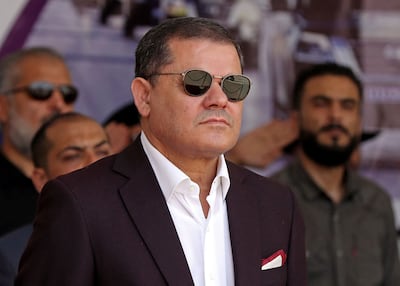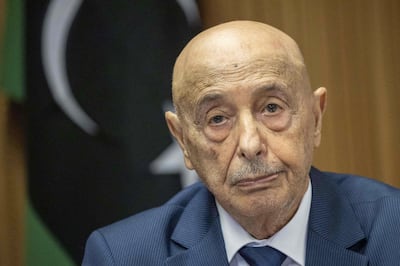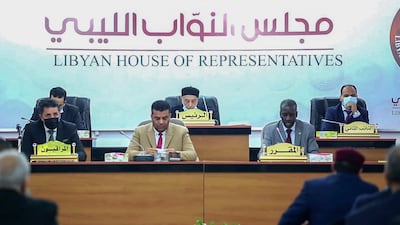Libya’s Benghazi-based House of Representatives and Tripoli's High State Council have agreed to outline a road map for legislative and presidential elections to form a new and unified government.
More than 130 members of the two councils met in Cairo on Thursday – the latest round of reconciliation talks in the war-torn North African country – and discussed the potential mechanisms needed to get Libya out of its political stalemate.
Libya’s Tripoli-based National Unity Government, headed by disputed Prime Minister Abdul Hamid Dbeibah, did not join the Cairo talks.
Mr Dbeibah’s government, which was formed in February 2021, has been repeatedly accused by other Libyan parties of lacking legitimacy due to its formation within a transitional context and not through an electoral process.

Since the overthrow of Libyan dictator Muammar Qaddafi’s regime in 2011, the country remains divided because of a continuing rivalry between two governments – in Tripoli and Benghazi – with different armed factions’ attempting to seize control of the oil-rich North African state.
In a statement after the meeting, Libyan officials said that they would submit a jointly drafted proposal as a “basic path to completing the remaining requirements necessary to reach the elections”.
They stressed the need “to hold presidential and legislative elections in accordance with the agreed-upon laws as issued by the House of Representatives”.
Libyan legislators also called for “the formation of a single new government” and announced the immediate opening of nominations and accepting of candidacies for the prime minister's post and government positions.
“The House of Representatives is to announce the opening of nominations and begin receiving recommendations, as well as studying files of the potential candidates that could head a competent government composed of new national competencies that will supervise the running of the country’s affairs,” the statement said.
Several rounds of reconciliation talks have failed to fulfil the promise of holding legislative and presidential elections, the most recent being in 2021, which eventually fell through due to disagreements about the electoral law and who should be allowed to stand in the polls.

Aguila Saleh, Speaker of the Libyan House of Representatives, described the development as “a positive step in the right direction”.
“[Mr Saleh] stresses the need to implement the [Cairo meeting] statement and the beginning of procedures for the formation of a new executive authority in accordance with the Constitutional Declaration and its amendments,” his office said.
Mansour Al Hasadi, a member of Libya’s High State Council, told local Libyan news outlets that the Cairo meeting was “the compass” that would determine Libya’s main goal for seeking an exit from its current political crisis.
“A unified government under the supervision of the House of Representatives and the High State Council is a must to deal with [Libya’s] security, economic and legal challenges, and to protect public funds,” he said.
Mr Al Hasadi also stressed the need to fulfil Libyans' desire to hold presidential and parliamentary elections as soon as possible, and called on the UN mission in the country to communicate with all political parties to support this endeavour.
In April, the UN's Libya envoy, Abdoulaye Bathily, resigned from office and cited the stalled political progress in talks between political parties as one of the reasons.
Mr Bathily also criticised the UN for failing to support the country’s political transition and Libyan politicians for putting their personal interests above the final aim of reaching a solution.
“Key Libyan institutional stakeholders appear unwilling to resolve the outstanding politically contested issues that would clear the path to the long-awaited elections in Libya,” he told the Security Council in February.
Members of the House of Representatives and High State Council also rejected what they called as “the principle of seizing power by imposing a fait accompli”, without taking into account the people’s will.


